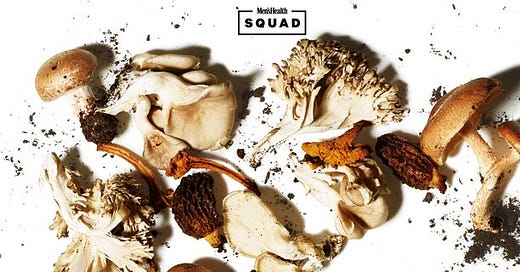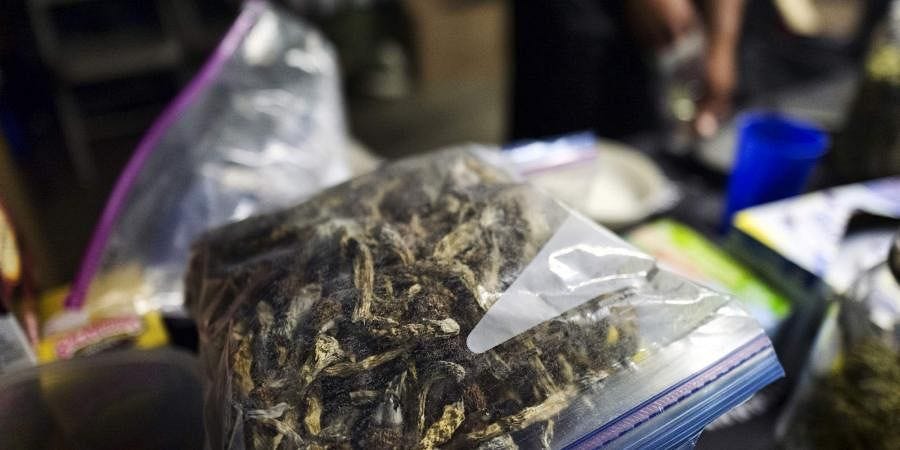From Consuming Mushrooms for Health, to Growing Mushrooms from Beer
Fungi Fridays Issue #52 - October 14th, 2022
Another week come, another week gone…
Hey there Fungi Friday fam,
Happy Friday! The weather is getting nice and cool here in the Midwest, its officially feeling like fall! Not a whole lot to update you on, plans are still in motion though. As you’re reading this, we may or may not be heading down ot the farm to check out that new location. Need to assess the power and water situation and get the trailer moved. Hopefully can do so in the next week, so we can squeeze in that last grow cycle of the year, before we pack it all up and head into winter, preparing for the thaw and a more successful 2023 grow!
Just because the grow season is ending though, doesn’t mean the fungi stories are, and we’ve got a few good one’s for you this week. So let’s check them out!
The Nutrition Snob's Guide To Getting the Most Out of Mushrooms
Feature numero uno this week goes into all sorts of details about different mushrooms and what type of benefits their consumption can provide. Here are a few examples:
Cremini - Helps to fight heart disease
Oyster - High in iron. Good for promoting blood flow and muscle recovery
Shitakke - Highly satiating. Good for weight loss
Maitke - Boost liver function.
After discussing the benefits of some of these tasty mushrooms, they even gave out a few recipes to try. Here’s the oyster one, if anyone would like to give it a try!
Oyster Mushroom Tortilla
Serves 4
2 red onions, sliced
3 mixed-colour bell peppers, sliced
2 garlic cloves, minced
1kg oyster mushrooms, torn
2 tsp smoked paprika
1 tbsp soya sauce
4 tortillas
200g guacamole
200g salsa
Method
In a frying pan, sauté the onions, peppers, garlic and mushrooms until the mushrooms are soft. Sprinkle over the paprika and add the soya sauce, then allow it all to cook for an additional 2 mins. To build your tortilla, load it with a generous serving of the mushroom and pepper mix and a dollop of guacamole and salsa, before wrapping it up and stuffing it
in your mouth. This could get messy.
If anyone gives this a try, i’d love to hear about it, so drop your thoughts in the comments below!
Treating postpartum depression with psychedelics
Feature number two in this weeks Fungi Friday goes into the psychedelic realm and discusses how psilocybin may be able to treat postpartum depression. For those not familiar, postpartum depression’s symptoms can include low mood, an inability to feel pleasure, insomnia, poor concentration, and feelings of inadequacy or guilt.
While the article starts off with the disclaimer, as many psilocybin articles do, that do date, much more research is needed on this topic, the good news is we do have quite a few studies going on around the world looking into psychedelics.
As is believed to be found in those studies, psychedelics are thought to work by stimulating receptors in the brain for a chemical messenger known as serotonin, setting off a cascade of effects. Hallucinations are thought to occur partly because the drugs affect the way our brains filter sensory information through the thalamus. Psychedelics may also affect how different regions of the brain communicate with each other.
So while there have yet to be any serious studies on psychedelics and postpartum depression quite yet, they are coming. And with postpartum depression affecting so many worldwide, with such limited treatment options, they are needed.
Gourmet mushrooms like lion’s mane and shiitake grown sustainably in brewers’ grains and waste breadcrumbs foster circular economy
And for the final feature of the week, let’s take a look at the circular economy of growing mushrooms from waste products. In the past, we’ve covered stories where people have grown mushrooms on all sorts of substrates. From straw and sawdust to used coffee grounds and oil spills, mushrooms tend to be able to consume, and thus grow, on so many different substances. One that we haven’t yet covered though, is growing mushrooms on the waste products that come from brewing beer!
Brewing beer you say? Well not from the beer itself, but through that process brewers are left with a grain substrate that remains after the mashing process. This grain product is typically just a waste product, but through the experimentation, these mushroom farmers have actually been able to grow seven different species including lions mane and shittake.
Thus far, the team has recycled 5.5 tons of grain and 18 tons of bread, which allow them to grow and sell 8 to 10 tons of mushroom PER WEEK. Beyond just the profit incentive though, the team takes pride in being able to produce these mushrooms to serve their local communities. And that’s honestly the coolest part about this article and the circular economy idea in general. One man’s trash is another man’s treasure. So while the beer brewery might see their grain as a waste product, rather than simply discarding it, another group has been able to swoop in and put it to productive use!
Want even more? Here are some other interesting, mushroom focused reads of the week:
Why You May Want To Add A Mushroom Supplement Into Your Daily Routine
Fungal pigment proves promising source of cancer-fighting compounds
As always, thank you for reading this weeks edition of Fungi Friday’s! If you enjoyed what you found, please feel free to forward to friends also interested in the Fungi Community!
And if you were forwarded this post and enjoyed what you found, please subscribe below:




